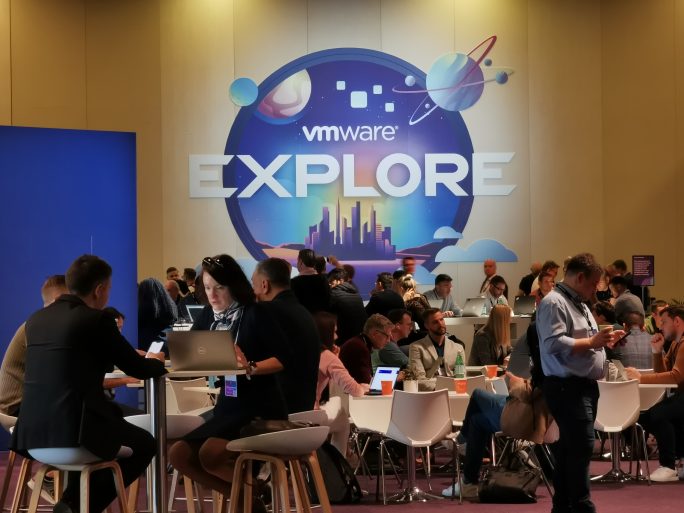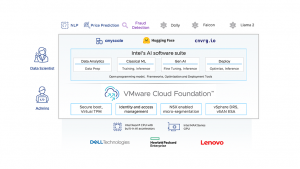Private AI Comes to the VMware Cloud

At the VMware Explore conference, the company showcases advances to address the complexity of hybrid environments and address data privacy concerns raised by artificial intelligence algorithms.
The Cloud-Smart approach that VMware began pushing a year ago to address the complexity of hybrid multi-cloud environments continues to bear fruit.
In this new edition of the VMware Explore conference being held this week in Barcelona in front of almost 9,000 attendees, the manufacturer has announced several new developments that join those announced during the North American edition a few months ago.
This is the case of the advances in the VMware Cloud strategy, the sovereign cloud, computing at the perimeter of networks, modernisation of applications and its commitment to private artificial intelligence, as we describe below.
The VMware Cloud and its Cloud-Smart approach
The software manufacturer has always defended a discourse based on the coexistence of different alternatives or modalities around the cloud, as well as the resistance of various on-premise environments, those that prevail despite major cloud advances due to their criticality or simply the difficulty in modernising them.
But the result of all this has generated extremely complex environments, those we call hybrid and multicloud, where corporate resources can be hosted in any location depending on the needs or interests of each organisation.
Computing, storage, networking, security and management have been distributed across these private and public cloud environments, as well as those of other providers and more recently in sovereign cloud environments.
The VMware Cloud strategy has been developed precisely to cover all these scenarios and make it easier for organisations to create and deploy workloads in any of them, but also to move them from one place to another as appropriate at any given time.

A development that is taking into account all the needs, challenges and threats faced by its customers, from data services to application development, security, disaster recovery or the implementation of artificial intelligence at different levels. At the heart of this strategy is VMware Cloud Foundation, the platform that brings together all the aforementioned services of computing, storage, networking, security and cloud management.
VMware CEO Raghu Raghuram said during his keynote speech at the VMware Explore keynote: “For the past several years we have been investing in a portfolio of solutions to accompany organisations on their multi-cloud journey. We have done this through our Cloud-Smart approach, which in practice allows us to accelerate the build and deployment of modern applications, as well as modernise and expand cloud infrastructure to the edge of networks.”
Artificial Intelligence and the need to make it private
As part of the innovations VMware has implemented in its solution portfolio, artificial intelligence has also become strategic for the company. These are advances that make it possible to automate tasks and extract value from the data that organisations manage, but also to greatly facilitate the work of professionals in their day-to-day work. Generative artificial intelligence is the latest example of this and is currently in full explosion and adoption by organisations.
However, it also generates important challenges that need to be addressed as soon as possible, such as privacy and sovereignty of the data that feeds any type of artificial intelligence.

It should not be forgotten that AI would not exist without data, from which it learns to make or suggest decisions and automate all kinds of tasks.
Nevertheless, the mere fact that AI can have access to corporate information to deploy its full potential is a problem for any type of organisation, even more so if we take into account the different regulations that exist worldwide.
The situation is further complicated by the growing popularity of generative artificial intelligence, whose success is largely based on its democratisation and the help it can provide to any corporate user in their day-to-day work.
María José Talavera, general manager of VMware Iberia, explained at a press conference on the occasion of VMware Explore: “The important thing about generative AI is to be able to apply it correctly in each use case, but it is also necessary to have a secure architecture to run these workloads that handle huge amounts of information. This is where VMware comes in and the different agreements we have reached with different partners to provide a private computing environment even in the public cloud to preserve data privacy and sovereignty.

It should be noted that we are in the early stages of the adoption of generative AI, but it is estimated that by 2025 the volume of business around data in the European Union will be 829 billion euros, with 11 million jobs associated with the data economy. Against this backdrop, corporate data cannot be made available to generative AI because its governance is likely to be lost and, more dangerously, it could be used by anyone for criminal purposes, among other things.
“Therefore, it is necessary for companies to be able to make use of these artificial intelligence models in private environments and to be able to work with cloud providers that guarantee data privacy through a series of certifications,” said Talavera, who said that he is already working with some 50 sovereign cloud providers worldwide, including Telefónica in Spain.
We also had a chat with Ignacio Arrieta, Solutions Engineer Director for VMware Iberia, who offered us interesting technical details about the company’s vision for the execution of workloads based on artificial intelligence.
“Artificial intelligence applications are, by design, distributed applications. They are going to coexist 99% of the time in containers and will require specific networking characteristics, low latency, high performance storage, the latest in computing, etc. But they are still applications that can be deployed via containers in the private or public cloud, in the perimeter or on their own servers. This greatly facilitates their availability, performance and elasticity for each specific case, but can also generate problems of governance or privacy of the data that the AI is using to train itself and return results.
The improvements that come with the implementation of private AI in VMware’s cloud platform seek to solve these problems that, on many occasions, can be critical for organisations. Banking is one of the most striking cases as it can use customer data to train AI to return the requested results, so a completely isolated environment must be ensured to prevent data leakage when developers, analysts or other banking employees are accessing such resources.
To realise consistent and compliant private AI while maintaining a commercial balance to extract maximum value from the data that organisations handle, VMware has also announced an agreement with Intel to provide VMware Private AI, which is the combination of VMware Cloud Foundation with Intel’s AI software packages, Intel Xeon processors and Intel Max Series graphics subsystems.

Together, VMware Private AI will enable data preparation, model training, fitting and inference to accelerate scientific discovery and enrich services to businesses and consumers.
“When it comes to AI, there is no longer a reason to debate the trade-offs of choice, privacy and control. Private AI empowers customers with all three, enabling them to accelerate AI adoption while future-proofing their AI infrastructure,” said Chris Wolf, vice president of VMware AI Labs, at the conference.
Indeed, all agreed that this is an architecture that addresses the data privacy concerns enterprises have today, but is prepared for the future challenges posed by incoming AI and governance regulations that are likely to change over the years.